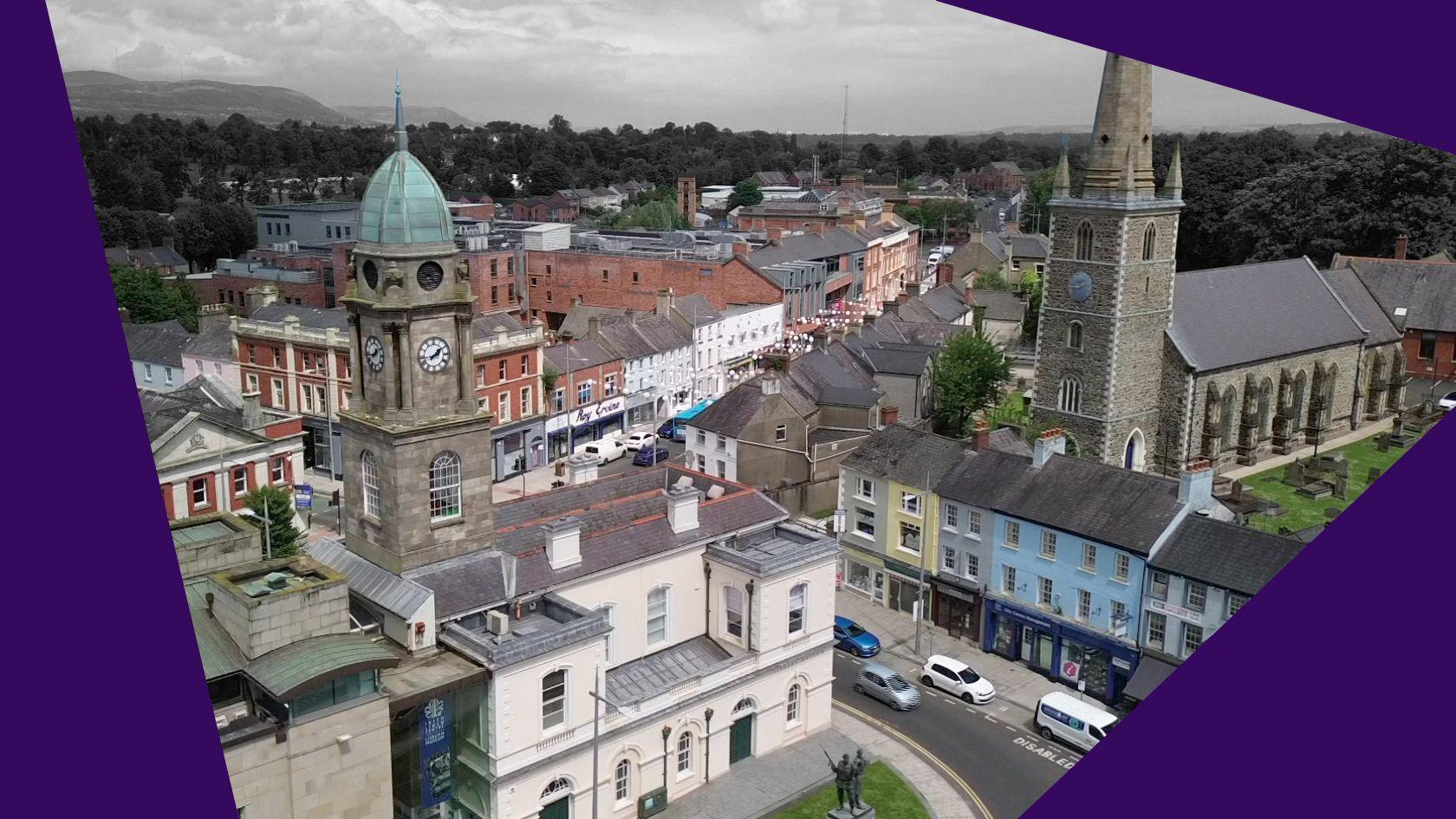Northern Ireland constituency profile: Lagan Valley

The city of Lisburn is the biggest population centre in the Lagan Valley constituency
- Published
In its 40-year history, just two people have been MP for Lagan Valley: the former Ulster Unionist leader James Molyneaux and his one-time protégé Jeffrey Donaldson.
A unionist majority was never in doubt, just the size of it.
In other words, Lagan Valley has been the surest of sure things for unionism. But no more.
In 2019, Alliance Party candidate Sorcha Eastwood got within 6,499 votes of Sir Jeffrey, the first time the winning majority for the Ulster Unionists or the DUP dropped to four figures.
The Alliance vote was up 17.1%, the DUP vote down by 16.4%.
Admittedly Brexit played a major role in the election, but nevertheless Alliance was buoyed.
Why is this a key constituency?
The absence of Sir Jeffrey this time - after being charged with rape and other historical sexual offences - has only added to the Alliance party's optimism that it can topple this great unionist monolith.
Sir Jeffrey has not responded publicly to the charges against him, but the BBC understand he wrote to the party saying he would be strenuously contesting the charges.
If the middle-ground party succeeds, it will have dealt a major blow to unionist confidence.
But the DUP, with new candidate Jonathan Buckley running, remains the favourite, albeit one that can no longer take victory for granted.
What’s different from 2019?
This one is easy - the absence of Sir Jeffrey Donaldson.
He was MP for 27 years, defending it seven times. The only thing that changed was the party he represented.
There had been speculation that with devolution restored after steering the DUP back into Stormont, he would have retired to a quieter life on the red benches of the House of Lords.
That all changed on Good Friday. Overnight he disappeared from frontline politics to face a very different fight in the courts.
Who to replace him with in Lagan Valley left his party in a quandary.
The two assembly members for the area - Emma Little Pengelly and Paul Givan - are both executive ministers.
Losing either from Stormont would have been a very big call.
Instead, the DUP have gone in a different direction, plucking 32-year-old Mr Buckley from Upper Bann for the fight of his political life.
He - and they - know failure is not an option.
But still, there is Alliance's Sorcha Eastwood who will believe the fates have aligned in her favour and the Ulster Unionist Robbie Butler who tends to perform solidly without threatening to upset the odds too much.
Two other things have changed from 2019.
Sinn Féin is not running. On the face of it that's good for Alliance, though it allows the DUP to use it as a stick to motivate its voter base.
But the TUV is in the field, which may not be good news for the DUP.
What candidates are running in Lagan Valley?
Jonathan Buckley - DUP
Robbie Butler - UUP
Patricia Denvir - Green Party
Sorcha Eastwood - Alliance
Simon Lee - SDLP
Lorna Smyth - TUV
Will boundary changes affect Lagan Valley constituency?
The constituency gains around 7,500 new voters from Upper Bann: Dollingstown which is solidly unionist; Aghagallon which is solidly nationalist, and Magheralin.
Drumbo is lost to South Belfast and Mid Down, and more significantly Dunmurry is lost to West Belfast.
It's a close call but in a race between the DUP and Alliance, the changes probably represent a marginal uptick to the DUP.
Where will the battle be won and lost?
The DUP go into this election nervous about two things.
How much can the TUV eat into their vote with those unionists disgruntled about a return to Stormont with the Irish Sea Border still in place?
And to what extent are the middle classes still angry at the party for Stormont's two-year absence?
Party activists still seem traumatised by their reception on doorsteps in 2019 from people who blamed them for Stormont's collapse, even though it was Sinn Féin who walked out.
Sinn Féin are absent from the race, but do their voters stay at home or get behind the candidate who can most hurt the DUP: Sorcha Eastwood?
It's another reason why the Alliance Party believes it will never have a better chance.
Another thing is the Donaldson factor.
He may not be there, but to what extent, if any, will voters punish the DUP for what has happened?
Logically it should not be a factor, but voters are difficult to predict.
